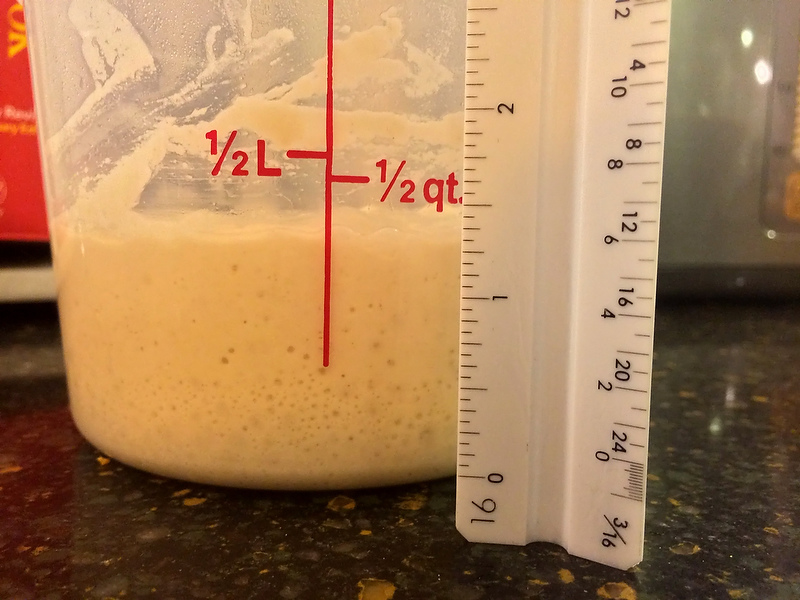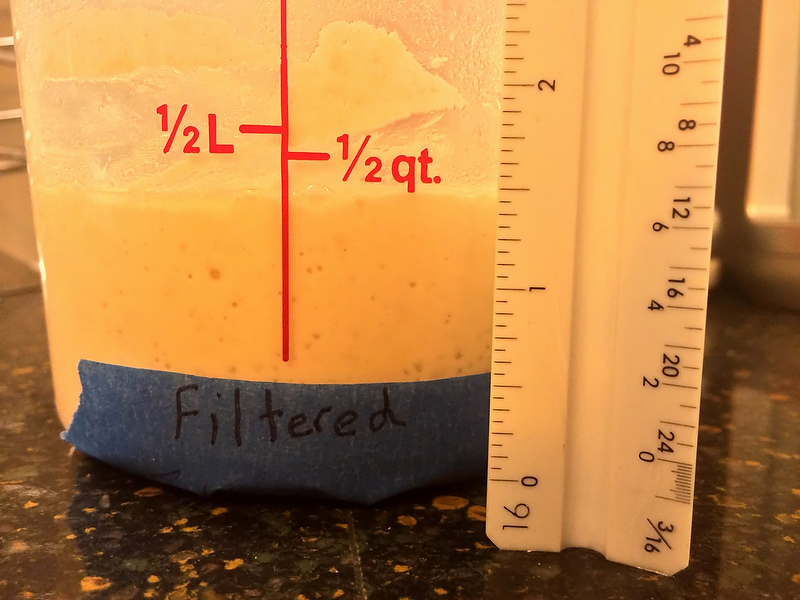I've been nagged by the question of whether using tap water, virtually all of which is treated with various anti-microbial chemicals (e.g., chlorine) has an adverse affect on the yeast on which we all rely for our bread.
I decided to test this with my starter. I took two containers and seeded each with 30g of my starter, plus 75g of flour and 75g of water. For one batch I used tap water (Marin Municipal) and for the second batch I used water filtered through a carbon filter which should remove the chlorine, as well as some other chemicals.
The results were not overwhelming, but after just short of 10hrs the filtered water batch definitely rose more than the tap water batch.
Anyone else ever try this?


While the preview fails, apparently the Save does work and you can see the photographs of the two batches.
As I only drink filtered water, I would not bake with tap (there is nothing wrong with my tap, and in fact my filters last over six months). However, everybody has different water depending on its source and certainly how water is treated may have an impact on both yeast and bacteria growth.
All of that said, your tap water looks more active to my eye due to what seem to be more bubbles. I would not draw any conclusions from this test, however, without seeing the "before" photos and measurements. While one is a bit higher than the other, it may have started out that way. And even if it did not, it is possible that the tap was in fact more active and rose and fell by the time you measured it.
I assume your tap and filtered water were both at the same temperature? If not, of course, that would cause differences in yeast activity.
Regarding filters, charcoal filters are used to remove chlorine in marine (i.e., boat) reverse osmosis desalination systems where the fresh water used for flushing the system may include shore supply water because the chlorine will damage the filtration membrane. A charcoal filter is only good for six months after it first becomes wet. It may still filter particulate matter, but it's chemical filtering properties will be exhausted. If you rely on them for filtering your tap water you need to change them every six months irrespective of usage.
With regard to my little experiment, the two containers began with exactly the same amount of starter, flour and water.
Your point regarding temperature is a good one. The filtered water came from my refrigerator and was roughly 40F while the tab water was roughly 60F. This should have given the tap water a head start. Of course when actually baking I adjust the water temperature based on the conditions that day to produce the desired dough temp.
These measurements were after only 10hrs while both batches were still expanding. By the next morning, about 21hrs, both had risen and fallen making measurements irrelevant.
Tap water versus filtered tap water? I guess you have proof (sorta) that there's a difference. Have you tried water that has never been chlorinated, like a bottled natural spring water, or a well water? I would expect an even bigger difference there. Even better yet, try using coffee instead of plain water of any kind. Sounds strange, but I did it just for kicks, and it really takes off! I had read that coffee makes yeast live longer (and humans, too!) So, my thought is that if the yeast lives longer, it is eating more food, producing more gas, and making more babies in that extra time. You can almost sit there and watch it grow (and subsequently fall) before your eyes. Let the coffee cool to room temp before mixing it in, unless you want runaway fermentation, in which case let it cool to 110 degrees or so.
Oh my TFL ate my post again. Luckily i copied it to my clipboard because this happens so often.
filtered water. In 24 hours the chlorine will have dissipated and the yeast will love the tap water for its wonderful; minerals and nutrients missing in the RO or filtered water. My SD actually likes the soaker water from grain sprouts the best and it too is full of great minerals and nutrients not even found in tap water with the chlorine removed.
Some tap water is crap though, like the tap water where Iive. Just horrible with or without chlorine
filtered water. In 24 hours the chlorine will have dissipated and the yeast will love the tap water for its wonderful; minerals and nutrients missing in the RO or filtered water. My SD actually likes the soaker water from grain sprouts the best and it too is full of great minerals and nutrients not even found in tap water with the chlorine removed.
Some tap water is crap though, like the tap water where Iive. Just horrible with or without chlorine
ever to happen is there?
filtered water. In 24 hours the chlorine will have dissipated and the yeast will love the tap water for its wonderful; minerals and nutrients missing in the RO or filtered water. My SD actually likes the soaker water from grain sprouts the best and it too is full of great minerals and nutrients not even found in tap water with the chlorine removed.
Some tap water is crap though, like the tap water where Iive. Just horrible with or without chlorine
Different utilities treat their water with different chlorine-bearing chemicals. Chlorine will off-gas, lowering the chlorine content in the water. Chloramine will not, so leaving it out overnight won't make a difference. The chloramine will still be in the water the next morning and still be effective. A person would have to find out what their water provider uses to provide protection against bacteria in the water.
Paul
Thank you, Paul. Ever since seeing it suggested here on the forum many months ago, I've been dutifully leaving tap water out overnight before using it in sourdough starters, levains, and doughs. I just checked with my municipality after reading your note and learned that our water is treated with chloramine rather than chlorine so I guess that's been pointless. I'm very glad you shared that info. :)
strikes again!
My water tastes pretty good. If I were a yeasty beastie bug, I'd do a back stroke in it, race others in it, do laps.
I have been emptying my tea kettle water into a pitcher for starters and dough but I don't think I need to.
Ask the pet shop in your neighbourhood. Mine told me the water was so good they didn't have to pre-treat it for fish tanks.
and again. I now have trained myself to:'select all and copy' before hitting save for anything on this site.
I use zero water filters and get a reading of 000 dissolved solids for over six months. It eliminates chlorine. I like it. Filters are expensive because they are best of breed. But for me I like that I don't have to replace filters until my tester tells me too. With Brita I had no idea when the filter needed replacing.
I live in ny and my water is great. That is why my filters last so long. I wouldn't bother using them except I live in an old house and don't know if I have lead in my water and never checked.
The ph of the water can make a difference, and that would not be addressed by a filter. My well water tends to be slightly alkaline.
I had well water years ago that was highly acidic - so much so that I was warned by the guy testing the water that my fixtures couldn't be expected to last very long - the water will dissolve them. That water didn't taste good at all, and a carbon filter did nothing for it. It made the worst coffee, too, no matter what I did. I should have tried adding chlorine to it, since chlorine is alkaline. I wasn't baking at the time, but I suppose my sourdough would have loved it.
I was advised by my well driller that if the water had been even mildly acidic, it would be best to correct it for health reasons. Slightly alkaline was not, from what I was told and have read, viewed as a big problem. My starter probably does not like it much, although it seems to do fine….adaptable those little "yeasty beasts." The equipment to adjust the pH of well water is expensive (near $2,000 was quoted), so I was happy to pass on installing it. Good that you are living with a better water supply now! Happy baking...
used to taste awful from all the chlorine it was treated with. I never use it for baking, always filtered water from the Brita.
But, in the meantime, our water/sewer plant upgraded their system, and the tap water tastes fresh. I drink a lot of water, when the tap water tastes funny again, I filter the water for the breads. Otherwise, it's just fine.
Karin
The test I did was quite simple, certainly not conclusive.
Anyone else care to give it a try? I'd be curious what results others might experience.
Don't own two of the same measuring devices, don't want extra work in the name of science unless it results in a loaf of bread and most importantly, on such a small sample with a scale that measures only in grams, I would never know if one measurement of starter was the same as the other which could be .4 grams more or less and still read 30 grams so that there could be as much as .8 grams difference and still read 30 for both. More than enough to account for tiny variances. (29.6 grams and 30.4 grams both read 30 on my scale)